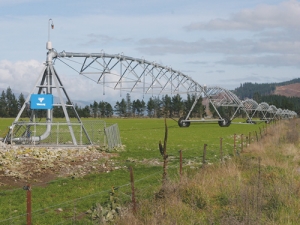Forest & Bird launches 2025–2026 Summer Adventure Challenges for all ages
Forest & Bird's Kiwi Conservation Club is inviting New Zealanders of all ages to embrace the outdoors with its Summer Adventure Challenges.
 IrrigationNZ says a severe El Nino could mean many farmers will run short of water half way through this season.
IrrigationNZ says a severe El Nino could mean many farmers will run short of water half way through this season.
With strong indications of an El Nino this summer, farmers are being urged to plan how they will use their seasonal irrigation volume.
IrrigationNZ says a severe El Nino could mean many farmers will run short of water half way through this season.
INZ chief executive Andrew Curtis was responding to NIWA's prediction that the current El Nino pattern is on track to be "the second most intense since 1950", with soils around the country drying out fast and irrigation in full swing as temperatures rise.
Guidelines released recently by the government urged farmers to use irrigation water efficiently and plan for water restrictions as they prepared for El Nino.
MetService says the pool of abnormally warm seas centred on the equator now extends right across the Pacific Ocean from South America to Vanuatu. Sea temperatures in August across the central Pacific exceeded 2 degrees above normal. It is the strongest El Nino since 1997-98, by all indicators.
Curtis says the focus for irrigators needs to be on spreading their water allocations further this season.
"Timing is everything in a marginal season. Irrigators need to start the season well and maintain consistent performance. Inefficient irrigation now will have a huge impact on whether your irrigation volume will see you through to March.
"Irrigation scheduling is central to this, particularly now irrigators are limited in the water they have in seasonal volumes. With water meters in place, irrigating farmers should be watching closely what they are using, regularly reviewing soil moisture levels and crop requirements and applying water as efficiently as possible. Following the dry winter there's no
room for waste or poor performance as every drop of water will be needed this summer. We recommend sitting down and planning your water budgets."
Appropriate irrigation scheduling, maintaining irrigation equipment and keeping it performing to specification will minimise down-time, leakage or delivery problems, Curtis says.
"Ensuring irrigators are working as they should guarantees you're getting the best from the water you apply. Simple early-season calibration checks can save a lot of water over the season and are a no-brainer to do. Some systems may be 20-30% out and using more water than you need will shorten your irrigation budget significantly."
As the season goes on, regular maintenance will be essential, says Curtis.
"Checking pressure and sprinklers is recommended.
Tips for summer
Ministry for Primary Industries (MPI) Director General Ray Smith believes there is potential for an increase in dairy farming in New Zealand.
New Zealand's new Special Agricultural Trade Envoy, Horowhenua dairy farmer, company director and former Minister of Agriculture, Nathan Guy says the Free Trade Agreement (FTA) with India is a good deal for the country.
New figures show dairy farmers are not only holding on to their international workforce, but are also supporting those staff to step into higher-skilled roles on farm.
New tractor deliveries for 2025 jumped 10% compared to the previous year, a reflection of the positive primary sector outlook, according to the Tractor and Machinery Association (TAMA).
Entries have opened for two awards in the New Zealand Dairy Industry Awards (NZDIA) programme, aimed at helping young farmers progress to farm ownership.
Federated Farmers has confirmed interim chief executive Mike Siermans to the role.
OPINION: When it comes to New Zealand's foreign relations, Foreign Minister Winston Peters likes to make all the big calls;…
OPINION: Another example of the dairy sector getting shortchanged in free trade deals?